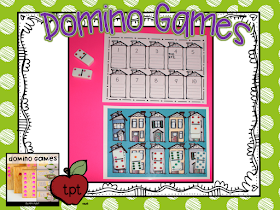Let's take a look at Math Centers.
The first part of Math Workshop is the Mini Lesson. The Mini Lesson is where the new learning occurs. It follows the scope and sequence for the year. The Mini Lesson has 4 components:- Connect to Prior Knowledge: "Remember when..."
- Teach the New Skill: "Today I am going to show you..."
- Active Engagement: "Now it's your turn."
- Link: "Remember boys and girls, today and everyday, good mathematicians..."
After the Mini Lesson, the children move to centers. I divide my room into 5 center areas. This way, I can make sure that we are revisiting all of the standards throughout the year. These areas are NEVER new learning. They are review activities of things that we have already learned.
- Data and Sorting
- Geometry
- Measurement
- Counting and Cardinality
- Number and Operations
- Operations and Algebraic Thinking
We divide our kids into "family" groups. These are the kids they go to centers with. Each day a family group visits one of the center areas. Each center area is labeled with one of the jungle animals.
When they get to their center area, the first thing the do is the "have to" activity. These activities are review of previously taught standards. They are things that the kids know how to do independently. These centers are product driven. The kids will have something to turn in to let us know they did the center. The yellow tubs are for literacy centers and the green tubs are for math centers.
When they finish the "have-to" center, the children move to the "can-do" centers. Each of the 5 areas has their own storage unit.
Can do centers are manipulatives, games, books, or songs. These don't usually have a product. They are things the kids have done before. Just look in your closet...anything math...puzzles, counting games, etc... can be can do centers. Here are some examples of some "can do" centers.
To play Roll and Build, each child needs a game board, a dice, and linking cubes. First, they roll the dice and count that many cubes. Then, they put the cubes on the board. They can put them in any square, putting all the cubes in one tower on one number, or put a few on each number. The object is to make a tower in each square to match the number. This game is from our Linking Cubes Unit.
To play this domino game, each child needs a game board. The children take one domino at a time and count the dots. They put it on the house with the numeral that represents the sum. They continue until all of the dominoes are on the houses. They can use a recording sheet and write the combinations for each number. This is from my Domino Unit.The children need a partner to play this card game. Put a stack of cards between the 2 children. Each child turns over a card. They compare for more and less and lay it on the game board accordingly. The child who had the card with less, spins the spinner. If it lands on less, the child with less gets both cards. If it lands on more, the child with more gets both cards. This is from my Cards Unit.
While the children are working in centers, I meet with small groups, usually 2 groups a day. I use ESGI, a formative assessment tool, to help me group my kids according to where they are on the standard I am teaching. Then, while the kids are working in centers, I walk around the room and collect the children I need. After they finish my table, they go back to their center area and keep working.
Haven't heard of ESGI? You can try it for free for 2 months. Go to their website ESGI and use the code "adsit" to get two months free. This will also give you $40 off if you decide to purchase.













You are coming to my town (Grand Rapids, MI) in May and I, along with several of my co-workers, just registered! I am soooooo excited to learn from you in person!
ReplyDeleteHopefully the frigid temps and gray skies will be gone by then! :)
Jill
abcs and polkadots
I can't wait to see you in Indy in February!!! Dream come true!
ReplyDeleteStephanie
Thanks for the great pictures of your math centers. Love the graphics and organization.
ReplyDeleteI attended the conference in Austin this past week and absolutely loved your workshops! You are smart, witty, and chock full of fabulous ideas! Thank you so much for sharing your talents with us! Hope you come back next year! :)
ReplyDeleteColleen Stites
When are you coming to LA?
ReplyDeleteRamon
Fonts 4 Teachers
I am in Austin, TX! I hope you enjoyed your stay!
ReplyDeleteErica
Sprinkles to Kindergarten
erica_crowder0612@yahoo.com
Thanks for sharing! <3 you Kim!!!
ReplyDeleteThanks for the fundraising and giveaway info! :)
ReplyDeleteThanks for the shout out Kim. We loved your workshop and hope you make it back to Oklahoma again some day. Hope you made it home before the snow!
ReplyDeleteTammy
First Grade @ Storybook Cafe
dtklinger@gmail.com
My whole team and I attended the conference in Austin (we teach in Round Rock) and we absolutely loved you! Thank you so much for all you do, all you shared, and all the laughs! (Tuesday's tie in to all the dogs was great!)
ReplyDeleteCan't wait to poke around your blog and store more!
Thanks again!
Sarah
First Class First Grade
Really enjoyed the CC workshop this week! I always come away with so many great ideas from you!! Can't wait to start creating some of them. (Already purchased the pvc to make myself a rekenrek!) :)
ReplyDelete